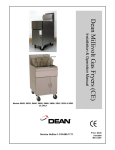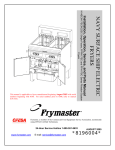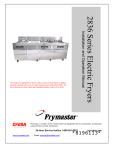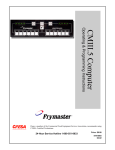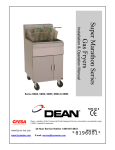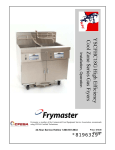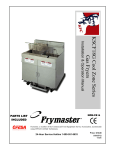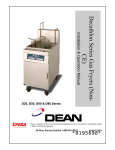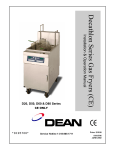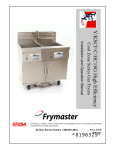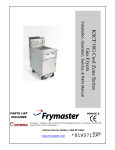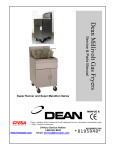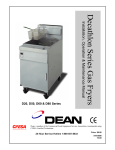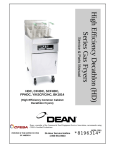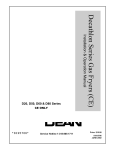Download Frymaster TB14 User's Manual
Transcript
TB14 Series Gas Fryers Installation & Operation Manual TB14 Series With Built-In Filtration PARTS LIST INCLUDED Frymaster, a member of the Commercial Food Equipment Service Association, recommends using CFESA Certified Technicians. *8195941* 24-Hour Service Hotline 1-800-551-8633 Price: $10.00 819-5941 OCTOBER 2002 Please read all sections of this manual and retain for future reference. NOTICE This appliance is intended for professional use only and is to be operated by qualified personnel only. A Frymaster/Dean Factory Authorized Service Center (FASC) or other qualified professional should perform installation, maintenance, and repairs. Installation, maintenance, or repairs by unqualified personnel may void the manufacturer’s warranty. See Chapter 1 of this manual for definitions of qualified personnel. NOTICE This equipment must be installed in accordance with the appropriate national and local codes of the country and/or region in which the appliance is installed. See NATIONAL CODE REQUIREMENTS in Chapter 3 of this manual for specifics. NOTICE Drawings and photos used in this manual are intended to illustrate operational, cleaning and technical procedures and may not conform to onsite management operational procedures. NOTICE TO OWNERS OF UNITS EQUIPPED WITH COMPUTERS U.S. This device complies with Part 15 of the FCC rules. Operation is subject to the following two conditions: 1) This device may not cause harmful interference, and 2) This device must accept any interference received, including interference that may cause undesired operation. While this device is a verified Class A device, it has been shown to meet Class B limits. CANADA This digital apparatus does not exceed the Class A or B limits for radio noise emissions as set out by the ICES-003 standard of the Canadian Department of Communications. Cet appareil numerique n’emet pas de bruits radioelectriques depassany les limites de classe A et B prescrites dans la norme NMB-003 edictee par le Ministre des Communications du Canada. DANGER Improper installation, adjustment, maintenance or service, and unauthorized alterations or modifications can cause property damage, injury, or death. Read the installation, operating and service instructions thoroughly before installing or servicing this equipment. Only qualified service personnel may convert this appliance to use a gas other than that for which it was originally configured. See Chapter 1 of this manual for definition of qualified service personnel. NOTICE The Commonwealth of Massachusetts requires any and all gas products to be installed by a licensed plumber or pipe fitter. DANGER Adequate means must be provided to limit the movement of this appliance without depending upon the gas line connection. Single fryers equipped with legs must be stabilized by installing anchor straps. All fryers equipped with casters must be stabilized by installing restraining chains. If a flexible gas line is used, an additional restraining cable must be connected at all times when the fryer is in use. DANGER The front ledge of the fryer is not a step. Do not stand on the fryer. Serious injury can result from slips or contact with the hot oil. DANGER Do not store or use gasoline or other flammable vapors and liquids in the vicinity of this or any other appliance. DANGER Instructions to be followed in the event the operator smells gas or otherwise detects a gas leak must be posted in a prominent location. This information can be obtained from the local gas company or gas supplier. NOTICE If, during the warranty period, the customer uses a part for this Enodis equipment other than an unmodified new or recycled part purchased directly from Frymaster/Dean, or any of its authorized service centers, and/or the part being used is modified from its original configuration, this warranty will be void. Further, Frymaster/Dean and its affiliates will not be liable for any claims, damages or expenses incurred by the customer which arise directly or indirectly, in whole or in part, due to the installation of any modified part and/or part received from an unauthorized service center. DANGER The crumb tray in fryers equipped with a filter system must be emptied into a fireproof container at the end of frying operations each day. Some food particles can spontaneously combust if left soaking in certain shortening material. Additional information can be obtained in the filtration manual included with the system. WARNING No structural material on the fryer should be altered or removed to accommodate placement of the fryer under a hood. Questions? Call the Frymaster/Dean Service Hotline at 1-800-551-8633. WARNING Do not bang fry baskets or other utensils on the fryer’s joiner strip. The strip is present to seal the joint between the frypot. Banging fry baskets on the strip to dislodge shortening will distort the strip, adversely affecting its fit. It is designed for a tight fit and should only be removed for cleaning. TB14 Series Gas Fryers Installation & Operation Manual TABLE OF CONTENTS Page # 1. INTRODUCTION 1-1 1.1 After Purchase 1-1 1.2 Ordering Parts 1-1 1.3 Service Information 1-1 1.4 Computer Information 1-1 1.5 Safety Information 1-2 1.6 Service Personnel 1-2 2. IMPORTANT INFORMATION 2-1 2.1 Product Description 2-1 2.2 Principles of Operation 2-1 2.3 Rating Plate 2-1 2.4 Pre-Installation 2-1 2.5 Air Supply and Ventilation 2-3 2.6 Equipment Installed at High Altitudes 2-3 2.7 Receiving and Unpacking Equipment 2-4 3. INSTALLATION 3-1 3.1 Installing the Fryer 3-1 3.2 Leveling the Fryer (fryers equipped with legs only) 3-1 3.3 Installing Casters and Legs 3-2 3.4 Gas Categories 3-3 3.5 Electrical Connections 3-6 4. FRYER OPERATIONS 4-1 4.1 Initial Start-up 4-1 4.2 Boil-Out Procedure 4-3 4.3 Final Preparation 4-4 TB14 Series Gas Fryers Installation & Operation Manual TABLE OF CONTENTS (CONT.) Page # 5. BUILT-IN FILTRATION 5-1 5.1 General 5-2 5.2 Filtration Preparation 5-3 5.3 Daily Filtration Operation 5-6 5.4 Operating the Filter 5-7 6. COMPUTER OPERATION 6-1 6.1 Operating Fryers with Computer Magic III.5 Computers 6-1 6.2 Programming the Computer Magic III.5 Computer 6-4 7. PREVENTATIVE MAINTENANCE 7-1 7.1 General 7-1 7.2 Daily 7-1 7.3 Weekly 7-1 7.4 Periodic/Annual 7-2 7.5 Stainless Steel 7-3 8. TROUBLESHOOTING 8-1 8.1 General 8-1 8.2 Pilot Burner Malfunction 8-1 8.3 Main Burner Malfunctions 8-2 8.4 Wiring Diagrams 8-4 9. PARTS LIST 9-1 9.1 Accessories 9-1 9.2 Cabinetry and Related Components 9-2 9.3 Computer and Related Components 9-4 9.4 Filter Module Components 9-5 9.5 Filter Pan Components 9-7 9.6 Frypot, Burners and Related Components 9-8 9.7 Oil Return Components 9-10 TB14 SERIES GAS FRYERS CHAPTER 1: INTRODUCTION 1.1 After Purchase In order to improve service, have the following chart filled in by the Frymaster Authorized Service Technician who installed this equipment. Authorized Service Technician/FASC Address Telephone/Fax Model Number Serial Number Gas Type 1.2 Ordering Parts Customers may order parts directly from their local factory authorized service center. For this address and phone number, contact your factory authorized service center or call the Frymaster Service Hotline phone number, 1-800-551-8633. To speed up your order, provide the model number, serial number, gas type, part needed, item part number (if known), and quantity needed. 1.3 Service Information Call the Frymaster Service Hotline, 1-800-551-8633, for the location of your nearest factory authorized service center. To assist you more efficiently, always provide the service technician with the model number, gas type, serial number, and the nature of the problem. 1.4 Computer Information This equipment has been tested and found to comply with the limits for a Class A digital device, pursuant to Part 15 of the FCC rules. While this device is a verified Class A device, it has been shown to meet the Class B limits. These limits are designed to provide reasonable protection against harmful interference when the equipment is operated in a commercial environment. This equipment generates, uses and can radiate radio frequency energy and, if not installed and used in accordance with the instruction manual, may cause harmful interference to radio communications. Operation of the equipment in a residential area is likely to cause harmful interference in which case the user will be required to correct the interference at his own expense. 1-1 TB14 SERIES GAS FRYERS CHAPTER 1: INTRODUCTION 1.4 Computer Information (cont.) The user is cautioned that any changes or modifications not expressly approved by the party responsible for compliance could void the user's authority to operate the equipment. If necessary, the user should consult the dealer or an experienced radio and television technician for additional suggestions. The user may find the following booklet prepared by the Federal Communications Commission helpful: "How to Identify and Resolve Radio-TV Interference Problems". This booklet is available from the U.S. Government Printing Office, Washington, DC 20402, Stock No. 004-000-00345-4. 1.5 Safety Information Before attempting to operate your unit, read the instructions in this manual thoroughly. Throughout this manual, you will find notations enclosed in double-bordered boxes similar to the ones below. CAUTION CAUTION boxes contain information about actions or conditions that may cause or result in a malfunction of your system. WARNING WARNING boxes contain information about actions or conditions that may cause or result in damage to your system, and which may cause your system to malfunction. DANGER DANGER boxes contain information about actions or conditions that may cause or result in injury to personnel, and which may cause damage to your system and/or cause your system to malfunction. 1.6 Service Personnel 1.6.1 Definitions A. Qualified and/or Authorized Operating Personnel 1. Qualified/authorized operating personnel are those who have carefully read the information in this manual and have familiarized themselves with the equipment functions, or have had previous experience with the operation of equipment covered in this manual. 1-2 TB14 SERIES GAS FRYERS CHAPTER 1: INTRODUCTION 1.6.1 Definitions (cont.) B. Qualified Installation Personnel 1. Qualified/authorized personnel are those who have carefully read the information in this manual and have familiarized themselves with the equipment functions, or who have had previous experience with the operation of the equipment covered in this manual. C. Qualified Service Personnel 1. Qualified service personnel are those who are familiar with Frymaster equipment and have been authorized by Frymaster to perform service on Frymaster equipment. All authorized service personnel are required to be equipped with a complete set of service parts manuals and stock a minimum amount of parts for Frymaster equipment. A list of Frymaster Factory Authorized Service Centers (FASCs) was included with the fryer when shipped from the factory. Failure to use qualified service personnel will void the Frymaster warranty on your equipment. 1-3 TB14 SERIES GAS FRYERS CHAPTER 2: IMPORTANT INFORMATION 2.1 Product Description Frymaster TB14 Series gas fryers are energy-efficient, tube-style, gas-fired units, design-certified by the International Approval Services (AGA/CGA), National Sanitation Foundation (NSF), and manufactured to their basic performance and application specifications. All units are shipped completely assembled with accessories packed inside the frypot. All units are adjusted, tested and inspected at the factory before shipment. Sizes, weights and input rates of all models are listed in this manual. NOTE: The on-site supervisor is responsible for ensuring that operators are made aware of inherent dangers of operating a deep fat fryer, particularly aspects of oil filtration, draining, and cleaning of the fryer. 2.2 Principles of Operation The incoming gas flows through orifices and is mixed with air in the burners to create the correct ratio for proper combustion. The mixture is ignited at the front end of each heat tube by the pilot light. Internal diffusers slow the flame as it goes through the burner tube. This slower and more turbulent flame gives much better heat transfer to the walls of the tubes, thereby heating the oil better. 2.3 Rating Plate The rating plate is attached to the inside right-hand corner of the front door panel. Information provided includes the model and serial number of the fryer, BTU/hr input of the burners, outlet gas pressure in inches W.C. (mbars) and whether the unit has natural or propane gas orifices. DANGER Fryers MUST be connected ONLY to the gas type identified on the attached rating plate. 2.4 Pre-Installation A. General: Only a licensed gas fitter should install any gas-fired equipment. 1. A manual gas shut-off valve must be installed in the gas supply line ahead of the fryers for safety and ease of future service. 2-1 TB14 SERIES GAS FRYERS CHAPTER 2: IMPORTANT INFORMATION 2.4 Pre-Installation (cont.) 2. Frymaster TB14 Series gas fryers require 120VAC 60 cycle or 230VAC single-phase 50hertz (International/CE) electrical service and are equipped with a 16-3 SJT grounded flexible power cord for a direct connection to the power supply. Amperage draw for each unit depends on the accessories supplied with the unit/system. B. Clearances: The fryer area must be kept free and clear of all combustibles. This unit is designcertified for the following installations: 1. Commercial installation only (not for household use). 2. Non-combustible floor installation equipped with factory-supplied 6-inch (15-cm) adjustable legs or 5-inch (13-cm) casters; 3. Combustible construction with a minimum clearance of 6-inches (15-cm) side and 6-inches (15-cm) rear, and equipped with factory-supplied 6-inch (15-cm) adjustable legs or 5-inch (13-cm) casters. DANGER Local building codes usually prohibit a fryer with its open tank of hot oil from being installed beside an open flame of any type, whether a broiler or the open burner of a range. C. Installation Standards: 1. U.S. installations must meet: 2. Canadian installations must meet: American National Standard Institute ANSI Z83.11 American Gas Association 8501 E. Pleasant Valley Road Cleveland, OH 44131 CAN 1-B149 Installation Codes Canadian Gas Association 55 Scarsdale Road Don Mills, ONT, M3B 2R3 National Electrical Code ANSI/NFPA #70 American National Standard Institute 1430 Broadway New York, NY 10018 Canadian Electric Code c22.1, part 1 Canadian Standards Association 178 Rexdale Blvd. Rexdale, ONT, M9W 1R3 NFPA Standards #96 and #211 National Fire Protection Association 470 Atlantic Avenue Boston, MA 02110 2-2 TB14 SERIES GAS FRYERS CHAPTER 2: IMPORTANT INFORMATION 2.4 Pre-Installation (cont.) 3. CE/EXPORT STANDARDS: Fryer installation must conform with local codes, or in the absence of local codes, to the appropriate national or European Community (CE) standards. 2.5 Air Supply and Ventilation Keep the area around the fryer clear to prevent obstruction of combustion and ventilation airflow as well as for service and maintenance. A. Do not connect this fryer to an exhaust duct. B. Correct installation and adjustment will ensure adequate airflow to the fryer system. C. A commercial, heavy-duty fryer must vent its combustion wastes to the outside of the building. A deep-fat fryer must be installed under a powered exhaust hood, or an exhaust fan must be provided in the wall above the unit, as exhaust gas temperatures are approximately 800-1000°F (427-538°C). Check air movement during installation. Strong exhaust fans in the exhaust hood or in the overall air conditioning system can produce slight air drafts in the room. D. Do not place the fryer’s flue outlet directly into the plenum of the hood, as it will affect the gas combustion of the fryer. E. Never use the interior of the fryer cabinet for storage or store items on shelving over or behind the fryer. Exhaust temperatures can exceed 800°F (427ºC) and may damage or melt items stored in or near the fryer. F. Adequate distance must be maintained from the flue outlet of the fryer(s) to the lower edge of the filter bank. Per NFPA Standards No. 96, a minimum of 18-inches (45-cm) should be maintained between the flue(s) and the lower edge of the exhaust hood filter. G. Filters and drip troughs should be part of any industrial hood, but consult local codes before constructing and installing any hood. The duct system, the exhaust hood and the filter bank must be cleaned on a regular basis and kept free of grease. 2.6 Equipment Installed at High Altitudes A. The fryer input rating (BTU/hr) is for elevations up to 2,000 feet (610-m). For elevations above 2,000 feet (610-m), the rating should be reduced four percent for each additional 1,000 feet (305-m) above sea level. B. The correct orifices are installed at the factory if operating altitude is known at time of the customer’s order. 2-3 TB14 SERIES GAS FRYERS CHAPTER 2: IMPORTANT INFORMATION 2.7 Receiving and Unpacking Equipment A. Check that the container is upright. Use an outward prying motion - no hammering - to remove the carton. Unpack the fryer carefully and remove all accessories from the carton. Do not discard or misplace these, as they will be needed. B. After unpacking, immediately check the equipment for visible signs of shipping damage. If damage has occurred, contact the carrier and file the appropriate freight claims. Do not contact the factory. Shipping damage responsibility is between the carrier and the dealer. If your equipment arrives damaged: 1. File claim for damages immediately, regardless of extent of damage. 2. Visible loss or damage: Be sure this is noted on the freight bill or express receipt and is signed by the person making the delivery. 3. Concealed loss or damage: If damage is unnoticed until equipment is unpacked, notify freight company or carrier immediately, and file a concealed damage claim. This should be done within 15 days of date of delivery. Be sure to retain container and all packing materials for inspection. NOTE: Frymaster Does Not Assume Responsibility for Damage or Loss Incurred in Transit. C. Remove all plastic skin from sides, front, and doors of the fryer(s). Failure to do this prior to initial fryer operation will make it very difficult to remove later. 2-4 TB14 SERIES GAS FRYERS CHAPTER 3: INSTALLATION 3.1 Installing the Fryer A. Initial Installation: If the fryer is installed with legs, do not push the fryer to adjust its position. Use a pallet or lift jack to lift the fryer slightly, then place the fryer where it is to be installed. B. Relocating the fryer: Remove all weight from each leg before moving a fryer with legs installed. Do not slide the fryer on the legs. C. If a leg becomes damaged, contact your service agent for immediate repair/replacement. 3.2 Leveling the Fryer (fryers equipped with legs only) A. All Installations: If the floor is uneven or has a definite slope, it is recommended to place the fryer on an even platform. B. Place a spirit level across the top of the fryer and level the unit both front-to-back and sideto-side. If it is not level, the unit may not function efficiently, the oil may not drain properly for filtering and in a line-up it may not match adjacent units. C. Adjust to the high corner and measure with the spirit level. If floor is uneven, level the unit with the screw adjustments on each leg (ensure minimum clearances as discussed in Chapter 2 are maintained during the leveling procedure). D. Re-leveling: If the fryer is moved, re-level the fryer following the above instructions. E. The install must be reviewed at the time of installation to ensure it meets the intent of these instructions. CAUTION Fryers must be at room temperature, empty of oil, and if fitted with legs, lifted during movement to avoid damage and possible bodily injury. DANGER Hot shortening can cause severe burns. Avoid contact. Under all circumstances, oil must be removed from the fryer before attempting to move it to avoid oil spills, and the falls and severe burns that could occur. This fryer may tip and cause personal injury if not secured in a stationary position. 3-1 TB14 SERIES GAS FRYERS CHAPTER 3: INSTALLATION 3.3 Installing Casters and Legs A. Install casters and/or legs near where the fryer is to be used, as neither is secure for long transit. TB14 Series gas fryers cannot be curb mounted and must be equipped with either legs or casters provided. B. After unpacking, use a pallet or lift jack to raise the unit before installing the casters. C. Align the caster or leg base holes with the leg support assembly and insert bolt. Install the washers and nut hand tight, and repeat for all four holes in caster/leg base assembly. D. Tighten the caster/leg against the leg support assembly by using appropriate tools. Ensure that all four bolts are evenly tightened. E. For fryers with casters, there are no built-in leveling devices. The floor where the fryers are installed must be level. Front View Rear Side View Optional CasterRear Only Optional CasterFront Only Rear Caster—5" Rigid Front Caster—5" Swivel w/Brake 1/4-20 x 3/4 Hex Bolt Front Channel or Rear Channel Front Channel or Rear Channel Leg Support Assembly Washer 1/4-20 Hex Head Locknut Front or Rear Leg with Mounting Plate 1/4-20 x 3/4 Hex Bolt Adjust as needed Caster/Leg Installation and Adjustment WARNING Frymaster fryers equipped with legs are for permanent installations. Fryers fitted with legs must be lifted during movement to avoid damage and possible bodily injury. For a moveable or portable installation, Frymaster optional equipment casters must be used. Questions? Call 1-800-551-8633 3-2 TB14 SERIES GAS FRYERS CHAPTER 3: INSTALLATION 3.4 Gas Connections DANGER Before connecting new pipe to this appliance the pipe must be blown out thoroughly to remove all foreign material. Foreign material in the burner and gas controls will cause improper and dangerous operation. NATIONAL CODE REQUIREMENTS This equipment is to be installed in compliance with the Basic Plumbing Code of the Building Officials and Code Administrators International, Inc. (BOCA) and the Food Service Sanitation Manual of the U.S. Food and Drug Administration. This equipment is manufactured to use the type of gas specified on the rating plate attached to the door. Connect equipment stamped "NAT" only to natural gas and that stamped "PRO" only to LP (Propane) gas. Installation shall be made with a gas connector that complies with national and local codes. Quick disconnect devices, if used, shall likewise comply with national and local codes. DANGER The fryer MUST be connected to the gas supply specified on the rating and serial number plate located on the back of the fryer door. DANGER If gas odors are detected, the gas supply MUST be shut off at the main shut-off valve. The local gas company or FASC should be contacted immediately to rectify the problem. A. The gas supply (service) line must be the same size or greater than the fryer inlet line. This fryer is equipped with a 3/4" (22 mm) male inlet. The gas supply line must be sized to accommodate all the gas-fired equipment that may be connected to that gas supply. Consult your contractor, gas company, supplier, or other knowledgeable authorities. Recommended Gas Supply Line Sizes Gas Types Natural Gas Propane Gas Number of Fryers 2 to 3 1" (28 mm) 3/4" (22 mm) 1 3/4" (22 mm) 1/2" (15 mm) 4 or more (*) 1-1/4" (35 mm) 1" (28 mm) (*) When exceeding 18 feet (6 meters) for a configuration of more than four fryers, it is necessary to provide a 1 1/4" (33 mm) rigid gas connection. 3-3 TB14 SERIES GAS FRYERS CHAPTER 3: INSTALLATION 3.4 Gas Connections (cont.) DANGER All connections must be sealed with a joint compound suitable for the gas being used and all connections must be tested with a solution of soapy water before lighting any pilots. Never use matches, candles, or any other ignition source to check for leaks. If gas odors are detected, shut off the gas supply to the appliance at the main shut-off valve and immediately contact the local gas company or an authorized service agency for service. DANGER "Dry-firing" your unit will cause damage to the frypot and can cause a fire. Always ensure that melted shortening, cooking oil or water is in the frypot before firing the unit. B. Rigid Connections: Check any installer-supplied intake pipe(s) visually and clean threading chips, or any other foreign matter before installing into a service line. If the intake pipes are not clear of all foreign matter, the orifices will clog when gas pressure is applied. Seal pipe joints with a sealant resistive to LP gas. When using thread compound on gas piping, use very small amounts and only on male threads. Use a pipe thread compound that is not affected by the chemical action of LP gases. DO NOT apply thread compound to the first two pipe threads—doing so will cause clogging of the burner orifices and control valve. C. Manual shut-off valve: This gas service supplier-installed valve must be installed in the gas service line ahead of the fryers in the gas stream and in a position where it can be reached quickly in the event of an emergency. D. Regulating Gas Pressure: The fryer and shut-off valve must be disconnected from the gas supply during any pressure testing of the system. 1. External gas regulators are not normally required on this fryer. A safety control valve protects the fryer against pressure fluctuations. If the incoming pressure is in excess of ½" PSI (3.45 kPa/35 mbar), a step-down regulator will be required. DANGER When pressure-testing incoming gas supply lines, disconnect the fryer from the gas line if the test pressure is ½" PSI [3.45 kPa (14 inches W.C.)] or greater to avoid damage to the fryer’s gas piping and gas valve(s). 3-4 TB14 SERIES GAS FRYERS CHAPTER 3: INSTALLATION 3.4 Gas Connections (cont.) E. Manifold Pressure: Only qualified personnel should check the manifold pressure with a manometer. 1. Check the rating plate for manifold gas pressures. Natural gas units normally require 4" W.C., and propane units normally require 11" W.C. gas pressure. 2. Double check the arrow forged into the bottom of the regulator body, which indicates gas flow direction. It should point downstream towards the fryers. The air vent cap is also part of the regulator and should not be removed. 3. If a vent line from the gas pressure regulator is used, it should be installed in accordance with local codes or in the absence of local codes, with the National Fuel Gas Code, ANSI Z223.1-(latest edition). WARNING Use a diluted soap solution to find potentially dangerous gas leaks when making new connections. F. Regulators can be adjusted in the field, but it is recommended that they not be tampered with unless the part is known to be out of adjustment or serious pressure fluctuations are found to exist and can be solved no other way. G. Only qualified service personnel should make adjustments to the regulators. H. Orifices: The fryer can be configured to operate on any available gas. The correct safety control valve, appropriate gas orifices, and pilot burner are installed at the factory. While the valve can be adjusted in the field, only qualified service personnel should make any adjustments with the proper test equipment. I. Flexible Couplings, Connectors and Casters: 1. If the fryer is to be installed with flexible couplings and/or quick-disconnect fittings, the installer must use a heavy-duty AGA design-certified commercial flexible connector of at least 3/4" NPT (with suitable strain reliefs), in compliance with the Standard for Connectors for Movable Gas Appliances, ANSI Z21.69-(latest edition) and Addenda Z21.69a-(latest edition). Quick disconnect devices must comply with the Standard for Quick-Disconnect Devices for Use with Gas Fuel, ANSI Z21.41-(latest edition). WARNING Do not attach accessories to this fryer unless fryer is secured from tipping. Personal injury may result. 2. The fryer must be restrained by means independent of the flexible coupling or connector in order to limit the movement of the fryer. Clips are located on the back panel of the fryer for the attachment of restraints. 3-5 TB14 SERIES GAS FRYERS CHAPTER 3: INSTALLATION 3.4 Gas Connections (cont.) 3. If disconnection of the restraint is necessary, this restraint must be reconnected after the fryer has been returned to its originally installed position. J. After hook-up, bleed the gas line of air to ensure that the pilot light will ignite quickly. K. CE Standards: If the unit is to be installed with flexible coupling, use a commercial flexible coupling certified as NF D 36123 (or other national standard) or a quick disconnect device certified NF D 36124 (or other national standard). 3.5 Electrical Connections The fryer when installed must be electrically grounded in accordance with local codes, or in the absence of local codes, with the National Electrical Code, ANSI/NFPA 70-(latest edition). DANGER This fryer is equipped with a three-prong (grounding) plug for protection against electrical shock and must be plugged directly into a properly grounded, three-prong receptacle. DO NOT CUT, REMOVE, OR OTHERWISE BYPASS THE GROUNDING PRONG ON THIS PLUG! The rating plate and wiring diagram are located inside the front door. The fryer is equipped with a 120VAC single-phase 60-hertz system (Domestic), or 230VAC single-phase 50-hertz system (International/CE). Do not cut or remove the ground prong from the power cord plug. Do not attempt to use the fryer during a power outage. DANGER This appliance requires electrical power for operation. Place the gas control valve in the OFF position in case of a prolonged power outage. Do not attempt to operate this appliance during a power outage. 3-6 TB14 SERIES GAS FRYERS CHAPTER 4: FRYER OPERATIONS 4.1 Initial Start-up WARNING The on-site supervisor is responsible for ensuring that operators are made aware of the inherent hazards of operating a hot oil frying system, particularly the aspects of system operation, oil filtration, draining and cleaning procedures. A. Cleaning: New units are wiped clean with solvents at the factory to remove any visible signs of dirt, oil, grease, etc. remaining from the manufacturing process, then coated lightly with oil. Before any food preparation, wash thoroughly with hot, soapy water to remove any film residue and dust or debris then rinse out and wipe dry. Also wash any accessories shipped with the unit. Close the drain valve completely and remove the crumb screen covering the heating tubes. Ensure the screws holding the thermostat and high-limit control sensing bulbs into the frypot are tight. WARNING Do not bang fry baskets or other utensils on the fryer’s joiner strip. The strip is present to seal the joint between the frypots. Banging fry baskets on the strip to dislodge shortening will distort the strip, adversely affecting its fit. It is designed for a tight fit and should only be removed for cleaning. DANGER Never operate this appliance with an empty frypot. The frypot must be filled with water or cooking oil/shortening before lighting the burners. Failure to do so will damage the frypot and may cause a fire. WARNING When checking for burner ignition or performance, do not get too close to the burners. Slow ignition can cause possible flashback, increasing the potential for facial and body burns. 4.1.1 Pilot Lighting Procedures, Standing Pilot Only Initial Pilot Lighting: All Dean fryers are tested, adjusted and calibrated to sea level conditions before leaving the factory. Adjustments to assure proper operation of pilot may be necessary on installation to meet local conditions, low gas pressure, differences in altitude and variations in gas characteristics. These adjustments correct possible problems caused by rough handling or vibration during shipment, and are to be performed only by qualified service personnel. These adjustments are the responsibility of the customer and/or the dealer and are not covered by the Dean Industries warranty. 4-1 TB14 SERIES GAS FRYERS CHAPTER 4: FRYER OPERATIONS 4.1.1 Pilot Lighting Procedures, Standing Pilot Only (cont.) The inlet pipe at the lower rear of the fryer brings incoming gas to the pilot safety control valve, then to the pilot and main burners. The pilot is located high in the cabinet center, at the base of the frypot. Light the pilot as follows: 1. Turn off the manual shut-off valve on the incoming service line. 2. Turn the operating thermostat or the computer off. 3. Depress the pilot gas cock dial on the combination control valve and turn to "OFF". ON OFF P Note: Inspect high-limit thermostat/temperature probe location prior to filling frypot with water or oil. Ensure that connecting hardware is intact and bulbs are properly attached. IL 4. Wait approximately 5 minutes for accumulated gas to disperse. OT 5. Fill the frypot with oil or water to the bottom OIL LEVEL line scribed on the frypot back. Ensure that heating tubes are covered in liquid prior to engaging burners. 6. Open the manual shut-off valve on the incoming service line. OF F 7. Apply lighted match or taper to the pilot burner head. P I L OT 8. Turn the gas cock dial on the control valve to "Pilot", then depress and hold the dial until the pilot stays lit (approximately 1 minute). ON 9. If the pilot fails to stay lit, depress the dial and re-light the pilot, depressing the dial longer before releasing. 4-2 OFF 11. Turn computer on, then ensure the main burners ignite from the pilot. P 10. When the pilot stays lit, turn the gas cock dial to "ON". IL OT ON TB14 SERIES GAS FRYERS CHAPTER 4: FRYER OPERATIONS 4.2 Boil-Out Procedure DANGER Never leave the fryer unattended during the boil-out process. If the boil-out solution boils over, turn the fryer off immediately and let the solution cool for a few minutes before resuming the process. To lessen the chance of boil over, turn the fryer’s gas valve knob to the PILOT position occasionally. WARNING Do not drain boil-out solution into a shortening disposal unit, a built-in filtration unit, or a portable filter unit. These units are not intended for this purpose, and will be damaged by the solution. DANGER Remove all drops of water from the frypot before filling with cooking oil or shortening. Failure to do so will cause spattering of hot liquid when the oil or shortening is heated to cooking temperature and may cause injury to nearby personnel. 1. Before switching the fryer(s) "ON", close the frypot drain valve(s). Fill the empty frypot with a mixture of cold water and boil-out solution. Follow instructions when mixing. 2. To program computer for Boil Feature, press either 3. Press the switch. switch. will appear in the left display. (1 6 5 3) in that sequence. The right display will read . The 4. Enter temperature is automatically set for 195°F (91°C). The fryer will attain this temperature and switch is pressed, which cancels the boil-out mode. In high-altitude remain there until either locations, constantly monitor the fryer for over boil. If over-boil occurs, turn off fryer immediately, allow to cool, and re-enter boil-out mode to continue the boil-out operation. 5. The burners will heat the boil-out solution to a simmer. Simmer the solution for approximately 45 minutes. Wearing protective gloves, scrub the sides of the frypot and the tubes with the Lshaped Teflon brush, being careful not to disturb the temperature sensing probes and the highlimit thermostat. 6. Do not allow the water level to decrease below the bottom OIL LEVEL line in frypot during boil-out operation. 7. After boil out is complete, press the switch to turn fryer off, and then drain the solution from the frypot. Place a metal pan or bucket under the drain port to collect the water from the frypot. DO NOT ALLOW BOIL-OUT SOLUTION TO DRAIN INTO FILTER PAN! 4-3 TB14 SERIES GAS FRYERS CHAPTER 4: FRYER OPERATIONS 4.2 Boil-Out Procedure (cont.) 8. Close the drain, add fresh water (without boil-out solution) and wash all surfaces of the frypot. Drain again. 9. Refill the frypot with fresh water and vinegar to neutralize any residual boil-out solution. Wash all surfaces of the frypot. Drain completely and wipe down all surfaces of the frypot to completely eliminate water from the frypot. 4.3 Final Preparation WARNING Do not go near the area directly over the flue outlet while the fryer is operating. Always wear oil-proof, insulated gloves when working with the fryer filled with hot oil. Always drain hot oil into a metal container. Hot oil can melt plastic buckets and crack glass containers. WARNING NEVER set a complete block of solid shortening on top of the heating tubes. To do so will damage the heating tubes and frypot, and void the warranty. A. When using a liquid shortening (cooking oil), fill the fryer to the bottom OIL LEVEL line scribed into the back of the frypot. B. When using a solid shortening, first melt it in a suitable container, or cut it into small pieces and pack it below the heat tubes, between the tubes and on top of the tubes, leaving no air spaces around the tubes. Do not disturb or bend the sensing bulbs. Never set a complete block of solid shortening on top of the heating tubes. To do so will damage the heating tubes and frypot, and void the warranty. switch to turn fryer on. The burners will initially operate in the MELT CYCLE C. Press the mode until the shortening reaches 180°F (82°C). It will then automatically switch to normal operation. D. When the frypot is filled and the shortening is melted, carefully replace the frypot crumb screen over the heat tubes. Wear oil-proof insulated gloves to avoid the potential for burn injury when replacing crumb screen. E. Before starting operation, program the computer to the probable working temperature and wait for the temperature to stabilize. 4-4 TB14 SERIES GAS FRYERS CHAPTER 5: BUILT-IN FILTRATION WARNING Drawings and photos used in this manual are intended to illustrate operational, cleaning and technical procedures and may not conform to on-site management operational procedures. WARNING The on-site supervisor is responsible for ensuring that operators are made aware of the inherent hazards of operating a hot oil filtration system, particularly the aspects of oil filtration, draining and cleaning procedures. WARNING When operating the filtration system, never leave the filter unattended. The action of the oil moving through the hose lines could jolt a flexible return hose (where applicable) out of the filter pan, spraying hot oil and causing severe burns. DANGER The crumb tray in fryers equipped with a filter system must be emptied into a fireproof container at the end of frying operations each day. Some food particles can spontaneously combust if left soaking in certain shortening material. IMPORTANT Cooking oil/shortening should be filtered at least daily, or more frequently if cooking is heavy. This assures the longest life possible for the oil and minimizes flavor transfer. 5-1 TB14 SERIES GAS FRYERS CHAPTER 5: BUILT-IN FILTRATION 5.1 General Frymaster TB14 Series gas fryers come equipped with a built-in filtration system. Photos used in the procedural illustrations may differ slightly from the filter unit that came with the frying system. The following procedures apply to all TB14 Series gas fryers equipped with built-in filter systems. Typical built-in filter installed in a TB14 fryer unit. 5-2 TB14 SERIES GAS FRYERS CHAPTER 5: BUILT-IN FILTRATION 5.2 Filtration Preparation On initial installation and before each use, remove all loose parts from the filter, wash the filter pan and all accessories in hot, soapy water and dry thoroughly. 5.2.1 Assembling the Filter The TB14 Series filter system uses filter paper held in place by a hold-down ring to filter impurities and debris from the cooking medium. The filter pan is assembled with the following components (see illustration below): 1. Filter pan. 7 2. Filter support grid. 6 3. Filter paper. 4. Hold-down ring. 5. Crumb screen. 6. Rear pan cover. 5 7. Front pan cover. 4 3 2 1 5-3 TB14 SERIES GAS FRYERS CHAPTER 5: BUILT-IN FILTRATION 5.2.1 Assembling the Filter (cont.) Assemble the filter as follows: 1. Place the support grid in the bottom of filter pan. Support grid properly placed in filter pan. 2. Put one filter paper sheet on top of the support grid. Be sure the paper covers the filter pan bottom and laps two inches onto the pan wall. Ensure filter paper overlaps two inches on all sides and is evenly distributed under the holddown ring. 3. Position the hold-down ring on top of the filter paper. Ensure the hold-down ring seals around the support grid. This prevents air from getting into the system. Hold-down ring positioned correctly over filter paper in filter pan. 5-4 TB14 SERIES GAS FRYERS CHAPTER 5: BUILT-IN FILTRATION 5.2.1 Assembling the Filter (cont.) 4. Sprinkle 8 ounces of filter powder on the filter sheet. Ensure the powder covers the filter paper evenly. Sprinkle the proper amount of filter powder evenly over the paper. 5. Place the crumb screen in the filter pan. Allow the crumb screen to rest on the top edges of the hold-down ring. Crumb screen properly placed. 6. Place filter pan covers (2) onto the filter pan assembly. Ensure the front cover is correctly positioned over the slip fitting. Fully assembled pan with proper placement of lid over slip fitting. 5-5 TB14 SERIES GAS FRYERS CHAPTER 5: BUILT-IN FILTRATION 5.2.2 Installing the Filter Slide the filter inside the fryer cabinet. Ensure the male-female slip-fitting coupling is fully engaged. The filter pan slides under the fryer (left), connecting with a slip fitting (right). [Note location of filter by-pass switch and filter reset breaker (arrow)]. 5.3 Daily Filtration Operation DANGER Use caution and wear proper protective clothing. The oil to be filtered is at or near 350°F (177°C). Ensure all hoses are connected properly and drain handles are in their proper position prior to operating any switches or valves. Failure to do this can result in severe burns. NOTICE Drawings and photos used in this manual are intended to illustrate operational, cleaning and technical procedures and may not conform to on-site management operational procedures. 5.3.1 General Overview The filter pump is turned on only after the shortening/oil is brought to operating temperature and drained into the prepared filter pan. The filter motor is then engaged and oil is drawn through filter paper and pumped back into the frypot. The frypot’s drain remains open during the filtering process. Allow the oil to cycle through the filter paper for approximately 5 minutes. At the end of 5 minutes, close the drain valve and allow the pump to fill the frypot to the top OIL LEVEL line. Leave the pump running for 10-15 seconds after bubbles appear in the frypot to ensure all shortening/oil is pumped from the drain pan and the lines. If the oil-return safety microswitch (activated by the oilreturn handle) should fail, the filter can be operated with the manual by-pass switch, located inside the left-bottom of the fryer cabinet. Ensure the oil return valve is open prior to engaging the by-pass switch, and closed prior to disengaging the by-pass switch. Use the manual by-pass switch only until the microswitch can be repaired. 5-6 TB14 SERIES GAS FRYERS CHAPTER 5: BUILT-IN FILTRATION 5.3.2 Filtering Tools Assemble tools to be used for filtering. These are supplied with the filter starter kit included with the fryer/filter system: • Frypot/Filter Brush - used to clean frypot and filter pan sides and bottom and to dislodge sediment during filtration or shortening/oil change. • Clean-Out Rod (design may vary)- used to dislodge heavy debris in the drain tube (when needed). • Filter Powder. • Filter Paper. The following tools are not required, but are recommended to make the filtering task easier. • Measuring Cup - used to measure filter powder. • Stainless Steel Crumb Scoop – for removing large debris from shortening/oil prior to filtering. Note: Always wear oil-resistant, insulated gloves and/or protective gear when working with hot oil. 5.4 Operating the Filter DANGER Draining and filtering of cooking oil or shortening must be accomplished with care to avoid the possibility of a serious burn caused by careless handling. The oil to be filtered is at or near 350°C (177°C). Ensure all hoses are connected properly and drain handles are in their proper position before operating any switches or valves. Wear all appropriate safety equipment when draining and filtering cooking oil or shortening. DANGER Allow oil/shortening to cool to 100°F (38°C) before draining into an appropriate container for disposal. 5-7 TB14 SERIES GAS FRYERS CHAPTER 5: BUILT-IN FILTRATION 5.4 Operating the Filter (cont.) DANGER Do not drain more than one frypot at a time into the built-in filtration unit to avoid overflow and spillage of hot oil/shortening. DANGER When draining oil/shortening into a disposal unit or portable filter unit, do not fill above the maximum fill line located on the container. DANGER NEVER attempt to drain cooking oil or shortening from the fryer with the burner lit! Doing so will result in a flash fire if the oil or shortening splashes onto the burner. Also, applying burner heat to an empty frypot will severely damage the frypot and void all applicable warranties DANGER NEVER attempt to clear a clogged drain valve from the front of the valve! Hot oil or shortening will rush out creating the potential for severe burns. DO NOT hammer on the drain valve with the cleanout rod or other objects. Damage to the ball inside will result in leaks and will void all applicable warranties. 5.4.1 Pan Preparation See Section 5.2.1– Assembling the Filter, and Section 5.2.2– Installing the Filter 5-8 TB14 SERIES GAS FRYERS CHAPTER 5: BUILT-IN FILTRATION 5.4.2 Filter Operation CAUTION NEVER operate the filter unit unless cooking oil/shortening is at operating temperature [~350°F (~177°C)]. 1. Turn the fryer off. Ensure the filter pan assembly is prepared as described in Section 5.2.1– Assembling the Filter. 2. Remove fry baskets from frypot. Prior to filtering, skim any large debris from the shortening/oil. Use extreme caution, as shortening/oil is at or near operating temperature [~350°F (~177°C)]. Prior to filtering, skim any large debris from oil in frypot. 3. Remove the support grid from the frypot using the clean-out rod. Stir the oil with the L-shaped Teflon brush to suspend debris prior to draining. Removing support grid from frypot prior to filtering. 5-9 TB14 SERIES GAS FRYERS CHAPTER 5: BUILT-IN FILTRATION 5.4.2 Filter Operation (cont.) 4. After ensuring the filter pan is correctly positioned under the drain tube, and the pandisconnect is properly connected, pull the red handle to drain the frypot into the filter pan. Pull the red handle to open the drain valve. 5. After all oil/shortening has drained from the frypot into the filter pan, pull the yellow handle to open the oil return line and activate the filter pump. Note: The filter system is equipped with a filter by-pass switch that will activate the filter system in case of return-microswitch failure (see section 5.3.1, page 5-6 for details). Pull the yellow handle to open the oil return valve and activate the filter pump. 5-10 TB14 SERIES GAS FRYERS CHAPTER 5: BUILT-IN FILTRATION 5.4.2 Filter Operation (cont.) 6. Oil will begin to pump from the filter pan into the frypot. If the frypot tubes, sides and bottom have sediment deposits, clean the frypot with the cleaning brush included with the fryer. Clean beneath and under the burner tubes, using care not to disturb the probes (arrow). Probe location will vary according to fryer system. Clean all sediment and suspended particles from the burner tubes and frypot as the oil begins to circulate. Use care not to disturb the probes (arrow) on the burner tube. 7. Allow the oil to circulate for approximately 5 minutes (process known as "polishing") to remove suspended particles. Polishing the oil removes suspended particles, which increases the life of the oil. 8. After the filter cycle is complete, close the drain valve (push the red handle until it stops) and allow the fryer to refill (see this section, Step #4 for additional reference). After filtering is complete, close the red drain handle to start refilling the frypot. 5-11 TB14 SERIES GAS FRYERS CHAPTER 5: BUILT-IN FILTRATION 5.4.2 Filter Operation (cont.) 9. After all oil is pumped back into the frypot, bubbles will form, indicating air in the oil return lines. Allow the oil to bubble for 1015 seconds to ensure all shortening/oil is evacuated from the return lines. Push the yellow handle to close the oil return valve and deactivate the filter pump (see this section, Step #5 for additional reference). Allow the shortening/oil to bubble for 10-15 seconds to ensure evacuation of all shortening/oil in the return lines. 10. If the oil level is low, add oil until the level is at the top OIL LEVEL line. Remember, the oil is at operating temperature. Add oil/shortening until the oil level is at the top OIL LEVEL line. DO NOT OVERFILL THE FRYPOT. 11. Replace the frypot grid, using care not to splash hot oil. Turn the fryer on. Replace the frypot grid, using care not to splash hot oil. 5-12 TB14 SERIES GAS FRYERS CHAPTER 5: BUILT-IN FILTRATION 5.4.2 Filter Operation (cont.) 12. Do not allow crumbs to accumulate in the crumb tray. The crumb tray MUST be emptied into a fireproof container at the end of frying operations EACH day (see DANGER statement below). Empty the filter pan crumb tray into a fire-proof container at the end of frying operations each day. DO NOT ALLOW CRUMBS TO ACCUMULATE IN TRAY. DANGER The crumb tray in fryers equipped with a filter system must be emptied into a fireproof container at the end of frying operations each day. Some food particles can spontaneously combust if left soaking in certain shortening material. WARNING Do not bang fry baskets or other utensils on the fryer’s joiner strip. The strip is present to seal the joint between the frypots. Banging fry baskets on the strip to dislodge shortening will distort the strip, adversely affecting its fit. It is designed for a tight fit and should only be removed for cleaning. 5-13 TB14 SERIES GAS FRYERS CHAPTER 6: COMPUTER OPERATION 6.1 Operating Fryers with Computer Magic III.5 Computers 1 4 6 3 8 2 5 7 ITEM 1 DESCRIPTION Lighted Display — left display of various functions and operations. 2 Lighted Display — right display of various functions and operations. 3 Program Lock and Temperature Check Switch — locks program in computer and/or displays frypot temperature when depressed. 4/5 Power Switches — either switch turns power "ON" or "OFF". 6/7 Product and Coding Switches — provides access to computer and programming functions. 8 Programming Switch — used when reprogramming the computer memory. WARNING Before turning on computer, ensure the fryer is filled with cooking oil/shortening or water. NEVER allow water to enter the Filtration System. 6–1 TB14 SERIES GAS FRYERS CHAPTER 6: COMPUTER OPERATION 6.1.1 Equipment Setup and Shutdown Procedures Setup WARNING Fill the frypot to the bottom OIL LEVEL line with vegetable oil before pressing the ON/OFF switch to the "ON" position. Failure to do so could damage the frypot. 1. Fill the frypot with vegetable oil to the bottom OIL LEVEL line located on the rear of the frypot. This will allow for oil expansion as heat is applied. Do not fill cold oil any higher than the bottom line; overflow may occur as heat expands the oil. If solid shortening is used, pack solid shortening into the cool-zone of the frypot. Continue to pack shortening in frypot to the bottom OIL LEVEL line. 2. Ensure that the power cord(s) is/are plugged into the appropriate receptacle(s). Verify that the face of the plug is flush with the outlet plate, with no portion of the prongs visible. 3. Ensure that the vegetable oil level is at the top OIL LEVEL line when the vegetable oil is at its programmed cooking temperature. It may be necessary to add vegetable oil to bring the level up to the proper mark, after the oil has reached the programmed cooking temperature. If solid shortening is used, the MELT cycle MUST be used to melt the shortening. It may be necessary to add solid shortening to bring the level up to the proper mark after the packed shortening has melted. DO NOT DISABLE OR CANCEL THE MELT CYCLE UNTIL ALL SOLID SHORTENING HAS MELTED. Shutdown 1. Press the ON/OFF switch to the "OFF" position (the display will show "OFF"). 2. Filter vegetable oil (if applicable) and clean fryers. See Chapter 7. 3. Place the frypot covers on frypots. Operating the Fryer A. Turn the computer on by pressing the switch. 1. One of the following displays will appear: a. , indicating that the burners are operating in the melt-cycle mode. Fryer will remain in the melt-cycle mode until it reaches 180°F (82°C) or is canceled manually. b. , indicating that the pot temperature is 21°F (12°C) or higher than the setpoint. c. , indicating that the pot temperature is 21°F (12°C) or lower than the setpoint. 6–2 TB14 SERIES GAS FRYERS CHAPTER 6: COMPUTER OPERATION 6.1.1 Equipment Setup and Shutdown Procedures (cont.) d. " " indicating that the fryer temperature is in the cooking range. NOTE: For best ". results, do not cook product until the display reads " e. , indicates a heating problem. f. , indicates that the pot temperature is more than 410°F (210°C) [395°F (202°C) for CE (European Community) fryers]. g. , indicates that the computer has detected a problem in the temperature measuring circuits, including probe. NOTE: "." decimal point between digits 1 and 2 in either display area indicates that the burners are on. B. Melt-Cycle Cancel Feature (built-in computers only). CAUTION Do not cancel the melt cycle mode if using solid shortening. The computer will display during melt-cycle operation. To cancel melt cycle on a full pot, depress the "R" button . To cancel the melt cycle on a split pot, use the "L" button for leftside pot and the "R" button for right-side pot. will be replaced by . The decimal point between digits 1 and 2 will illuminate indicating that the burners are on. C. Cook-cycle operation is initiated by pressing the product switch: 1. The basket lift (on fryers so equipped) will lower the product into the cooking oil/ shortening. 2. The display will indicate the programmed cook time and begin countdown. 3. If shake time is programmed, you will be notified to shake the product "X" seconds after the cook cycle begins (X= amount of time programmed). An alarm will sound and the display and the product number selected. If no shake time is programmed will will read not appear during the cook cycle. 4. At the end of cooking cycle, an alarm will sound; will be displayed and the associated product switch indicator will flash. To cancel the cook alarm, press the flashing product switch. 6–3 TB14 SERIES GAS FRYERS CHAPTER 6: COMPUTER OPERATION 6.1.1 Equipment Setup and Shutdown Procedures (cont.) 5. At this time, the hold time will be displayed (if programmed greater than 0) and countdown and the will begin. When the hold time counter reaches 0, an alarm will sound. product number selected is displayed. The hold alarm is canceled by pushing the switch. If display is in use, hold time will count down invisibly until display is free. 6.1.2 Checking Temperature A. Check the cooking oil/shortening temperature at any time by pressing the Check the setpoint by pressing the switch twice. switch once. B. During the idle periods, when the fryer is on but not in use, " " should appear on both displays on a single frypot computer. " " will appear on the display of the side that is turned on in a split-vat computer. If not, check actual temperature and setpoint. C. If you suspect a defective probe, check the cooking oil/shortening temperature with a thermometer. Insert the thermometer within 1-inch of the vessel-mounted probe. Verify that the computer readout is within ±5°F (±2°C) of the thermometer reading. NOTE: The electronic circuitry can be affected adversely by current fluctuations and electrical storms. If for no apparent reason the computer does not function or program properly, reset the computer by unplugging the power cord and plugging it back in. 6.2 Programming the Computer Magic III.5 Computer 1. Activate the computer by pressing either switch. switch. will appear in the left display. If 2. To enter the program mode, first press the switch again. you have pressed this switch in error and do not wish to program, press the Note: The computer will flash if cooking is in progress. 3. Press (1 6 5 0) in that sequence to enter the program mode. 4. (Setpoint) will appear in the left display. This is for setting the cooking temperature. The temperature previously selected will be displayed in the right display. Enter new temperature. Press the switch to lock in temperature setting. If the setting is correct, press the switch to cancel the selection. 5. (Select Product) will appear in the left display. Press the product button to be programmed. 6. will appear in the left display. The sensitivity number previously selected will be displayed in the right display. Enter the new desired sensitivity number, the range is 1 to 9. switch to lock in the setting. Enter "0" for no sensitivity. Press the 6–4 TB14 SERIES GAS FRYERS CHAPTER 6: COMPUTER OPERATION 6.2 Programming the Computer Magic III.5 Computer (cont.) Sensitivity adjusts computer-cooking time to compensate for the drop in cooking oil/shortening temperature when a basket of product is placed into the fryer. Sensitivity decreases or increases cooking time to counterbalance variances in product density, basket-load size, and initial temperature. A proper sensitivity setting will ensure a high quality product. For example: 4 ounces of fries can be programmed to cook to the same quality as 2 pounds. A good initial setting is 4 or 5. Some experimenting with the range of 1 to 9 may be required to achieve optimum quality. 7. will now appear in the left display. A previously entered cook-time will appear in the right display. If that time is correct, press the switch. If you wish to change the time, enter the desired time in minutes and seconds. (The new time will be displayed in the left display.) Press the switch to lock in the setting. 8. now appears in the left display. The previous shake time (if any) will appear in the right display. If a product requires shaking during the cooking process, set the shake time by pressing the number of minutes to cook before shaking. Press the switch to lock in the time. If no shake time is required, press "0" and press the switch. Example: Total cook time 3:00 minutes, shake after cooking 1:00 minute. At the end of 1:00 minute, a beeper will sound and the product button indicator will flash for three seconds. 9. will now appear in the left display. Set the time to hold the cooked product from 13 seconds to 60 minutes. Press the switch. If you do not wish to use the hold time, enter "0" and press the switch. 10. will appear in the left display. If you desire to program more products, return to Step 5. If no more programming is required, lock in program by pressing the switch. 6.2.1 Boil Feature CAUTION Do not drain water or boil-out solution into the filtration system (if applicable). Irreparable damage to the filter system will result and all applicable warranties will be voided. 1. Before switching the fryer "ON", close the frypot drain valve. Fill empty frypot with mixture of cold water and detergent. Follow detergent instructions when mixing. NOTE: Boil Mode will not turn on both sides of computer. Each side will have to be turned on separately. 6–5 TB14 SERIES GAS FRYERS CHAPTER 6: COMPUTER OPERATION 6.2.1 Boil Feature (cont.) 2. To program computer for boil feature, press either 3. Press the switch. switch. will appear in the left display. 4. Enter (1 6 5 3) in that sequence. The right display will read . The temperature is automatically set for 195°F (91°C). The fryer will attain this temperature and remain there until either switch is pressed, which cancels the boil-out mode. In high-altitude locations, constantly monitor the fryer for over-boil conditions. If over-boil occurs, turn off fryer immediately, allow to cool, and re-enter boil-out mode to continue the boil-out operation. SEE CHAPTER 4.2 FOR ADDITIONAL BOIL-OUT PROCEDURES. 6.2.2 Temperature Selection—Fahrenheit to Celsius 1. To change the computer temperature from Fahrenheit to Celsius or Celsius to Fahrenheit, press either switch. 2. Press the switch. will appear in the left display. 3. Enter (1 6 5 8) in that sequence. The computer will automatically convert the temperature from Fahrenheit to Celsius or Celsius to Fahrenheit. 4. Press the switch to display the temperature in the newly selected mode. 6.2.3 Constant Oil Temperature Display Mode 1. To program constant temperature display, press the 2. Press the switch. switch. will appear in the left display. 3. Enter (1 6 5 L) in that sequence. The cooking oil/shortening temperature will display constantly in the right display on a full-pot and in both displays on a split-pot. NOTE: During the product cooking process, the cooking time will not be displayed but timing will be taking place. 4. To remove the constant oil-temperature display and display the cooking time, repeat Step 2 and Step 3. 6–6 TB14 SERIES GAS FRYERS CHAPTER 7: PREVENTATIVE MAINTENANCE 7.1 General DANGER Never attempt to clean the fryer during the cooking process or when the frypot is filled with hot oil/shortening. If water comes in contact with oil/shortening heated to cooking temperature, it will cause spattering of the oil/shortening, which can result in severe burns to nearby personnel. Any equipment works better and lasts longer when maintained properly and kept clean. Cooking equipment is no exception. The TB14 Series gas fryer should be kept clean during the working day and thoroughly cleaned at the end of each day. Below are recommendations for daily, weekly and periodic preventative maintenance. 7.2 Daily WARNING Use a commercial grade cleaner formulated to effectively clean and sanitize foodcontact surfaces. Read the directions and precautionary statements for use. Particular attention must be paid to the concentration of cleaner and the length of time the cleaner remains on the food-contact surfaces. A. Remove and wash all removable parts. B. Clean all exterior surfaces of the cabinet. Do not use cleaners, steel wool, or any other abrasive material on stainless steel. C. Filter the cooking oil (See Chapter 5) and replace if necessary. The oil should be filtered more frequently when under heavy use. 7.3 Weekly A. Completely drain the oil from the fryer into a metal stockpot of sufficient size to safely hold the entire contents of the frypot for disposal. Do not use a glass or plastic container. B. Clean the frypot by following boil-out procedures in Chapter 4.2. WARNING Never allow water to boil down and expose the heating tubes. Frypot damage will result. 7-1 TB14 SERIES GAS FRYERS CHAPTER 7: PREVENTATIVE MAINTENANCE 7.4 Periodic/Annual This appliance should be inspected and adjusted periodically by qualified service personnel as part of a regular kitchen maintenance program. Frymaster/Dean recommends that this appliance be inspected at least annually by a Factory Authorized Service Technician as follows: • Inspect the cabinet inside and out, front and rear for excessive oil build-up and/or oil migration. • Verify that the flue opening is not obstructed by debris or accumulations of solidified oil or shortening. • Verify that burners and associated components (i.e. gas valves, pilot assemblies, ignitors, etc.) are in good condition and functioning properly. Inspect all gas connections for leaks and verify that all connections are properly tightened. • Verify that the burner manifold pressure is in accordance with that specified on the appliance’s rating plate. • Verify that the temperature and high-limit probes are properly connected, tightened and functioning properly, and that mounting hardware and probe guard are present and properly installed. • Verify that component box components (i.e. computer/controller, transformers, relays, interface boards, etc.) are in good condition and free from oil migration build-up and other debris. Inspect the component box wiring and verify that connections are tight and that wiring is in good condition. • Verify that all safety features (i.e. drain safety switches, reset switches, etc.) are present and functioning properly. • Verify that the frypot/cookpot is in good condition and free of leaks and that the frypot/cookpot insulation is in serviceable condition. Verify that the frypot tube diffusers are present and in good condition (i.e. no visible deterioration or damage). • Verify that wiring harnesses and connections are tight and in good condition. Built-in Filtration: • Inspect all oil-return and drain lines for leaks and verify that all connections are tight. • Inspect the filter pan for leaks and cleanliness. Empty crumbs in the crumb basket into a fireproof container. Clean basket daily. Advice owner/operator not to allow crumbs to accumulate in basket. Insist they clean the basket daily. • Verify that all O-rings and seals (including those on quick-disconnect fittings) are present and in good condition. Replace O-rings and seals if worn or damaged. 7-2 TB14 SERIES GAS FRYERS CHAPTER 7: PREVENTATIVE MAINTENANCE 7.4 Periodic/Annual (cont.) Built-in Filtration (cont.): • Check filtration system integrity as follows: − With the filter pan empty, place each oil return handle, one at a time, in the ON position. Verify that the pump activates and that bubbles appear in the cooking oil/shortening of the associated frypot. − Close all oil return valves (i.e., place all oil return handles in the OFF position). Verify proper functioning of each oil return valve by activating the filter pump using the lever on one of the oil return handle microswitches. No air bubbles should be visible in any frypot. − Verify that the filter pan is properly prepared for filtering, then drain a frypot of oil heated to 350°F (177°C) into the filter pan and close the frypot drain valve. Place the oil return handle in the ON position. Allow all cooking oil/shortening to return to the frypot (indicated by bubbles in the cooking oil/shortening). Return the oil return handle to the OFF position. The frypot should refill in no more than 2 minutes and 30 seconds. To ensure good fryer health and a safe environment, the fryer should be checked and adjusted periodically by qualified service personnel as part of a regular kitchen maintenance program. 7.5 Stainless Steel Care WARNING DO NOT let water splash into the tank of hot oil. It will splatter and can cause severe burns. All stainless steel fryer cabinet parts should be wiped regularly with hot, soapy water during the day, and with a liquid cleanser designed for stainless steel at the end of each day. A. Do not use steel wool, abrasive cloths, cleansers or powders. B. Do not use a metal knife, spatula or any other metal tool to scrape stainless steel! Scratches are almost impossible to remove. C. If it is necessary to scrape the stainless steel to remove any encrusted materials, soak the area first to soften the deposit, then use a wood or nylon scraper only. 7-3 TB14 SERIES GAS FRYERS CHAPTER 8: TROUBLESHOOTING 8.1 General DANGER Hot cooking oil/shortening will cause severe burns. Never attempt to move this appliance when filled with hot cooking oil/shortening or to transfer hot cooking oil/shortening from one container to another. DANGER This equipment should be unplugged when servicing, except when electrical circuit tests are required. Use extreme care when performing such tests. This appliance may have more than one electrical power supply connection point. Disconnect all power cords before servicing. Inspection, testing and repair of electrical components should be performed by an authorized service agent only. The problems and possible solutions covered are those most commonly encountered. To troubleshoot, perform the test set-up at the beginning of each condition. Follow each step in sequence. 8.2 Pilot Burner Malfunction A. Pilot will not ignite; no evidence of gas at pilot burner. 1. Check that gas valve is open and gas is present at the gas valve. 2. Check pilot burner orifice for dirt or lint. 3. Remove pilot burner gas-supply line and check for contamination; blow out if necessary, then reinstall. B. Pilot burner ignites but will not remain lit when gas valve manual knob is released. 1. Check that thermocouple lead is properly screwed into thermocouple connection bushing on gas valve. 2. Remove end of thermocouple lead from thermocouple connection bushing and clean with fine sandpaper or emery cloth. 3. Pilot flame may be too high or too low. Adjust pilot flame adjustment screw so that pilot flame extends about ¾-inch (19-mm) above the top of the pilot burner. 8-1 TB14 SERIES GAS FRYERS CHAPTER 8: TROUBLESHOOTING 8.2 Pilot Burner Malfunction (cont.) 4. Check all connections for cleanliness and security. C. Pilot flame of proper size, but is unstable. thermocouple completely at all times. Flame wavers and does not envelop the 1. Check for drafts that might be caused by air conditioning equipment or make-up air apparatus. Turn air-moving equipment off and recheck the pilot. 8.3 Main Burner Malfunctions A. Main burner will not come "ON"; gas not detected at main burner. 1. Check that the gas valve is open. 2. Check that the pilot is lit and is operating properly. 3. Check the high-limit thermostat for continuity. 4. The combination gas valve may be defective; replace if necessary. B. Main burner flames are small and appear lazy; shortening does not come up to temperature quickly. 1. Check gas pressure at the pressure tap of the gas valve. Use dial type or standard watertype U-gauge manometer. With burner in operation, the pressure should be 4" W.C. (10 mbar) for natural gas, and 11" W.C. (27.5 mbar) for propane. 2. If not, remove the pressure regulator adjustment cover. Use screwdriver to turn the adjusting screw for proper pressure. Replace cover, re-check pressure and re-install pressure tap plug. C. Signs of excessive temperature; shortening scorches and quickly becomes discolored. 1. Check gas pressure as outlined above. 2. Shortening used is of inferior quality and/or shortening has been used too long. Replace shortening. 3. Ensure frypot is clean when refilling with new shortening. 8-2 TB14 SERIES GAS FRYERS CHAPTER 8: TROUBLESHOOTING 8.3 Main Burner Malfunctions (cont.) D. Fryer will not reach the temperature setting and/or runs erratically. 1. Incorrect location of sensor probe or defective temperature sensor. 2. Loose wiring/wire connection E. Fryer shortening temperature cannot be controlled; fryer runs at high-limit temperature. 1. Defective temperature probe. 2. Call Service Technician. 8-3 RED WHT#1 CB T1 T2 T3 T8 T4 T5 BLK 24V 120V 8102097 MOTOR 120 VAC HEAT TAPE - 25 WATT P/N 8071420 BLK YEL WHT YEL YEL COM RED 24V COM NO NC BLK CB ORG WHT FUSE BLK MANUAL BY PASS SWITCH 8073580 WHT CIRCUIT BREAKER 115 V 7 AMP 8073577 230 V 5 AMP 8073538 BLK #2 OIL RETURN MICRO SWITCH 8072104 YEL NC NO GND ORG FUSE 8073611 OPTIONAL SUFF WIRING FOR CHANGE OF ROTATION INTERCHANGE LEADS T5 AND T8 ON THE MOTOR J BOX 2 AMP FUSE BLK BLK CIRCUIT BREAKER 115 V 7 AMP 8073577 230 V 5 AMP 8073538 WHT YEL 120 V WHT RED PN 8065974 SPEAKER HI LIMIT 8073559 1 2 3 4 5 6 7 8 9 10 11 12 BLU RED TO COMPUTER INTERFACE BOARD TO CONTROLLER 8051438A 1 2 3 4 5 6 7 8 9 10 11 12 13 14 15 CMIII 8067262 1 2 3 4 5 6 7 8 9 10 11 12 13 14 15 COMPUTER INTERFACE BOARD 8073651 SOUND GRD 1 2 3 4 5 6 7 8 9 10 11 12 A BLK WHT TRANSFORMER PN 8070855 BLU RED 12V WHT 120V PROBE ASSY 1060986 RED BLK #2 RED 1 2 1 2 1 2 1 2 WHT 8-4 PROBE RED FRYER CIRCUIT 120 VAC GAS VALVE 8073550 THERMOCOUPLE NATURAL GAS 8102156 LP GAS 8102323 TB14 SERIES GAS FRYERS CHAPTER 8: TROUBLESHOOTING 8.4 Wiring Diagrams 8.4.1 TB14 Series With Built-In Filtration BLU V2D L PWR J1 2 8-5 M T L-HEAT LED 2 Dual Operation Only 14 14 15 15 4 LEFT TEMP PROBE A 6 6 RL-1 LINE VOLTAGE 8 C 2 3 ON/OFF POWER 2 1 1 LED 6 1 LED 1 5 12V 7 12V L-GV R1 NC NO 3 3 C ON/OFF POWER 5 5 AIR LED 3 24V R-GV LED 5 8 24V 7 R2 NC NO A 4 4 RL-3 13 13 14 14 10 F1 M T 11 11 R-HEAT LED 4 HEAT 2 4 J3 J2 V1D R PWR RIGHT TEMP PROBE SD Sound: Terminal #1 - Loud Terminal #2 - Medium Terminal #3 - Low Sound Device PWR RL1 RL3 PWR V2D RL2 RL4 V1D J3 To Terminal Tab on Computer J1 Interface Board RL1 = 12VDC 2PST RL2 = 12VDC SPST (NOT USED) RL3 = 12VDC 2PST RL4 = 12VDC SPST (NOT USED) TB14 SERIES GAS FRYERS CHAPTER 8: TROUBLESHOOTING 8.4.2 TB14 Series Interface Board (Enlarged View) TB14 SERIES GAS FRYERS CHAPTER 9: PARTS LIST 9.1 Accessories 1 2 4 ITEM 1 2 3 4 5 PART # 803-0022 803-0277 810-1403 803-0278 106-1637SP 3 5 COMPONENT Basket, Fry – TB14 Grid Assembly, Frypot Basket Hanger, Wireform Brush, Teflon- L-Shaped Vat Cover, Frypot (Optional) 9-1 TB14 SERIES GAS FRYERS CHAPTER 9: PARTS LIST 9.2 Cabinetry and Related Components 15 16 17 18 19 14 13 4 12 9 10 5 20 3 11 8 2 7 6 1 9-2 TB14 SERIES GAS FRYERS CHAPTER 9: PARTS LIST 9.2 Cabinetry and Related Components (cont.) ITEM 1 2 3 4 5 6 7 8 9 * 10 11 * * * 12 13 14 15 16 17 18 19 * 20 * Not Illustrated PART # 823-3248 200-1148 201-3563 202-3563 210-2804 210-1380 200-1379 200-1301 810-2265 816-0529 810-0066 810-2105 809-0918 809-0191 810-0179 200-3565 824-1103 823-4072 200-1350 200-1343 200-2872 809-0167 200-3567 200-1376 200-3559 COMPONENT Support, Leg- Without Optional SUFF Filter Only Channel, Base, Front & Rear- Without Optional SUFF Filter Only Side, Cabinet- Left- Painted Side, Cabinet- Right- Painted Duct, Door Access Panel, Outer- Door Panel, Inner- Door Pin, Door Spacer, Nylon Bumper, Rubber (Self-Adhesive) Magnetic Catch, Door Handle, Chrome Screw, 10-24 x ½" Slotted Head (Use With 810-2105) Washer, ¼ Spring-Lock (Use With 810-2105) Plug, Handle-Screw Access Box, Component (Wireway Control) Top Cap, TB14 Flue Cap, TB14 Rear, Flue Front, Flue Shield, Flue Screw, Sheet Metal- #10 x 5/8" Back, Cabinet Bracket, Restraining (Attach To Cabinet Back) Shield, Back- SUFF Filter 9-3 TB14 SERIES GAS FRYERS CHAPTER 9: PARTS LIST 9.3 Computer and Related Components 1 2 3 9 4 10 5 ITEM 1 2 3 4 * 5 6 * 7 * 8 * 9 10 * * * * * Not Illustrated 6 PART # 210-3562 106-1188 823-3806 806-4549 806-7179SP 807-3684 807-3577 807-3538 807-3680 810-2046 807-1321 807-3592 807-0979 106-0986SP 210-1386 810-2164 809-0448 809-0360 7 8 COMPONENT Panel, Control- TB14 Computer, CMIII.5- TB14 Bezel, Computer- TB14 Board, Interface Sound Device Outlet, Filter Power- 120V Breaker, Circuit- 7 Amp (120V) Breaker, Circuit- 5 Amp (230V) Thermostat, High-Limit- 450°F Manual Reset Spring, Spacer- High-Limit Bulb Holder, Fuse- Buss Fuse Fuse, 2 Amp Transformer, 208/240V - 12V- Secondary Probe, Temperature Clamp, Probe Bulb and High-Limit Bulb Spring, Spacer- Probe Bulb Clip, Tinnerman (Sensor Probe and High-Limit Probe Clamp) Screw, Probe/H-Limit Bulb Clamp- #8 x 3/8 Slotted Hex Head 9-4 TB14 SERIES GAS FRYERS CHAPTER 9: PARTS LIST 9.4 Filter Module Components To Frypot 17 16 20 22 21 23 25 26 28 10 24 15 9 32 13 12 8 27 14 30 31 29 31 11 36 19 18 29 33 7 34 6 35 2 5 1 4 3 20 19 ITEM PART # 1 2 3 4 5 6 7 8 9 10 11 * * Not Illustrated 823-3791 201-3529 823-3792 202-3529 210-3636 823-3788 823-3789 200-3522 200-3524 823-3783 807-3577 807-3538 COMPONENT Support, Leg- Left Hand Base, Channel- Left Hand Support, Leg- Right Hand Base, Channel- Right Hand Slide, Filter Pan- Front Slide, Filter Pan- Rear Left Hand Slide, Filter Pan- Rear Right Hand Base, Filter- Lower Frame Cover, Access- Filter Base Lower Frame Base, Filter- Upper Frame Breaker, Circuit- 7 Amp (120V) Breaker, Circuit- 5 Amp (230V) 9-5 To Filter TB14 SERIES GAS FRYERS CHAPTER 9: PARTS LIST 9.4 Filter Module Components (cont.) ITEM PART # 12 13 14 * 15 16 17 18 19 20 21 22 23 24 25 26 27 28 29 30 31 32 33 34 35 36 * * Not Illustrated 807-3620 807-3795 807-1321 807-3592 200-3532 810-2252 810-2100 807-3571 807-3611 813-0460 813-0087 813-0062 813-0006 813-0625 810-2125 813-0003 813-0165 813-0156 813-0247 813-0173 813-0022 813-0515 823-3800 200-1230 813-0608 810-0697 826-1392 COMPONENT Switch, Toggle Mount, Inlet Holder, Fuse- Buss Fuse, 2 Amp Slow-Blow Cover, Inlet Mount Pump, Filter- 5 GPM Motor, Pump- 115/230VAC 1/3 HP Transformer, 120/24V- 40VA Relay, MEC GL-DPDT-24A Nipple, ½ NPT x 3" BM Nipple, ½ NPT x 1-½" BM Elbow, ½" NPT 90° BM Bushing, Hex- ½ x 3/8" NPT BM Nipple, 3/8" NPT x Close BM Valve, Ball- 3/8" Tee, ½" NPT BM Elbow, Street- ½" NPT 90° BM Plug, Hex- ½" NPT BM Nipple, ½ NPT x 3-½" BM Union, ½ NPT BM Nipple, ½" NPT x Close BM Nipple, ½ NPT x 12" BM Manifold Assembly, Suction Bracket, Base- Suction Manifold To Base Coupling, Full- ½" NPT BM Disconnect, Male O-Ring, Suction Manifold Disconnect (Qty:5) 9-6 TB14 SERIES GAS FRYERS CHAPTER 9: PARTS LIST 9.5 Filter Pan Components 11 9 12 10 8 6 1 5 4 2 3 ITEM PART # 1 2 3 * 4 5 6 * 7 8 9 * 10 11 12 * Not Illustrated 106-2257SP 810-0006 809-0822 809-0820 210-2291 809-0805 813-0679 813-0684 823-3736 823-3790 803-0317 803-0002 823-3795 823-3798 823-3797 COMPONENT Pan Assembly, Filter- SUFF 50 Caster- 2" Bolt, ¼-20 x ½" Steel Nut, ¼-20 Oval Locking Insert, Caster Mount Screw, ¼-20 x ½" Plug, 1/8" SS Square Head (Female Disconnect) Plug, 3/8" SS Hex (Pan Pick-up Tube) Basket, Crumb Catcher Grid, Filter Pan Paper, Filter Powder, Filter Ring, Hold-Down (Filter Paper) Lid, Filter Pan- Rear Lid, Filter Pan- Front 9-7 7 TB14 SERIES GAS FRYERS CHAPTER 9: PARTS LIST 9.6 Frypot, Burners and Related Components 1 3 2 4 25 34 32 26 27 29 28 7 33 30 5 31 35 36 8 6 38 10 19 23 37 16 18 24 9 15 22 11 17 12 13 14 21 20 9-8 TB14 SERIES GAS FRYERS CHAPTER 9: PARTS LIST 9.6 Frypot, Burners and Related Components (cont.) ITEM PART # 1 2 3 4 5 6 7 8 9 10 11 12 * 13 14 * 15 16 17 18 19 20 21 22 23 24 25 26 27 28 29 30 31 32 33 34 35 36 * 37 38 * * Not Illustrated 826-1871 200-1329 200-1330 823-3522 810-2150 810-2149 810-2151 200-1615 809-0822 809-0823 813-0154 810-2048 810-2059 810-2130 810-2156 810-2323 813-0109 813-0066 813-0119 813-0168 813-0174 813-0165 813-0793 810-2043 809-0821 813-0031 810-2126 210-2029 200-1940 200-1257 813-0391 823-3801 813-0348 823-3429 809-0885 809-0843 816-0547 810-2032 810-2155 810-0703 807-3550 810-2033 COMPONENT Frypot, SS- 1-¼" Drain System Bracket, Burner Mounting Shield, Burner Heat Diffuser, TB14 Burner, Right Burner, Center Burner, Left Support, Manifold- Left and Right Bolt, ¼-20 x ½" Nut, Nylock- ¼-20 Plug, Hex- 1/8" NPT Orifice #39 (2.53 mm)- Natural Orifice #53 (1.51 mm)- LP Manifold, Gas Valve, Gas- Robertshaw Natural Valve, Gas- Robertshaw LP Nipple, ¾" x Close NPT BM Elbow, ¾" 90° NPT BM Nipple, ¾ x 4" NPT BM Elbow, Street- ¾" 90° NPT BM Union, ¾" NPT BM Elbow, Street- 90° ½" NPT BM Nipple, ½ x 19-½" NPT BM Clamp, Pipe- ½" BM Pipe Screw, Pipe Clamp- ¼-20 x ¾ Hex Bushing, Hex- ½ to ¾" NPT BM Valve, Drain- 1-¼" Full-Port (Includes Washers and Nuts) Stop, Valve Handle (Activator) Actuator, Drain Handle Arm Push-Pull Retainer, Valve Handle Nut Nipple, 1-¼ NPT x Close BM Elbow Bracket Assembly, Drain Valve Nipple, Toe- 1-¼ x 6-1/8" Handle, Drain Valve Washer, Drain Valve Handle Pin, Cotter- Drain Valve Handle Cap, Red Vinyl- Drain Valve Handle Burner, Pilot- Natural Burner, Pilot- LP Gas Line, Pilot- ¼ x 17-½" Thermocouple Thermopile 9-9 TB14 SERIES GAS FRYERS CHAPTER 9: PARTS LIST 9.7 Oil Return Components 3 2 4 1 8 13 12 7 11 5 6 ITEM PART # 1 2 3 4 5 6 7 8 9 10 11 12 13 * * Not Illustrated 823-3531 809-0843 823-3344 809-0885 202-3538 809-0842 200-1341 809-0818 809-0803 809-0823 807-2104 809-0846 810-2144 807-1420 9 10 COMPONENT Handle, Oil Return Pin, Cotter- Oil Return Handle Actuator (Handle), Oil Return Washer, Actuator Bracket, Oil Return Microswitch Nut, 4-40 Nylock Bracket, Microswitch Rod (Oil Return Handle) Screw, #8 x ½" Type B Bolt, ¼-20 x ¾" Hex Head GR5 Nut, Nylock- ¼-20 Microswitch, Oil Return Screw, 4-40 x 1" Spacer, Microswitch Strip, Heater- 120V/25W 36" L- Oil Return System 9-10 Frymaster, L.L.C., 8700 Line Avenue, PO Box 51000, Shreveport, Louisiana 71135-1000 Shipping Address: 8700 Line Avenue, Shreveport, Louisiana 71106 TEL 1-318-865-1711 FAX (Parts) 1-318-219-7140 PRINTED IN THE UNITED STATES FAX (Tech Support) 1-318-219-7135 SERVICE HOTLINE 1-800-551-8633 Price: $10.00 819-5941 OCTOBER 2002





























































